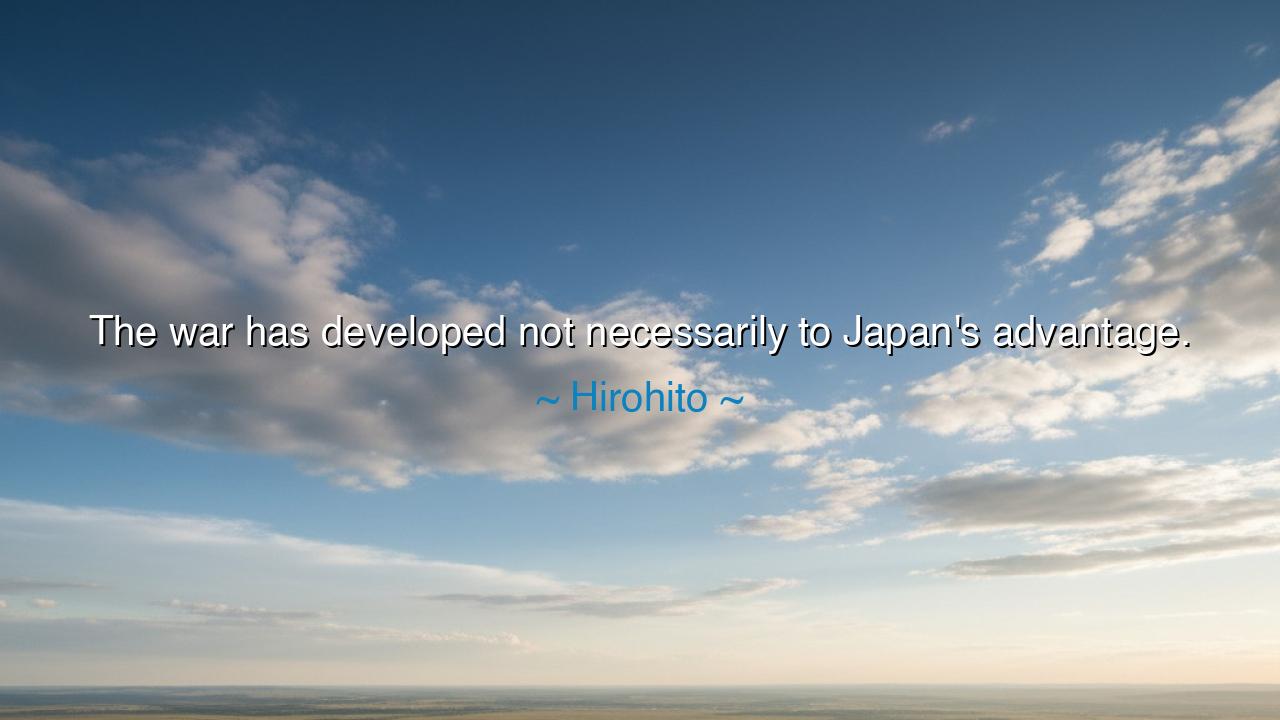
The war has developed not necessarily to Japan's advantage.






Hear, O listener, the solemn and understated words of Emperor Hirohito of Japan: “The war has developed not necessarily to Japan’s advantage.” In these restrained syllables lies a world of sorrow, for they were spoken at the twilight of the Second World War, when Japan lay broken, cities reduced to ash, and its people bowed under the weight of suffering. Though simple, these words carry the heavy mantle of imperial acknowledgment—that the gamble of conquest, once pursued with zeal, had ended in ruin. It was not merely a military admission, but a spiritual turning point for a nation.
The origin of this saying rests in the Emperor’s historic radio broadcast of August 15, 1945—the first time the Japanese people ever heard his voice. Known as the Gyokuon-h?s?, or “Jewel Voice Broadcast,” Hirohito addressed the nation following the atomic bombings of Hiroshima and Nagasaki, and the entry of the Soviet Union into the war. In choosing such restrained language—“not necessarily to Japan’s advantage”—he softened the devastation, veiling defeat with dignity. Yet beneath the formality, every listener knew the truth: Japan’s imperial dream had collapsed, and surrender was at hand.
Consider the contrast between the ambition with which the war began and the devastation with which it ended. Japan had sought to carve a vast empire across Asia and the Pacific, envisioning itself as a rising sun over a new order. But by 1945, Tokyo had been firebombed to rubble, Okinawa soaked in blood, Hiroshima and Nagasaki annihilated by nuclear fire. Millions were dead, and famine stalked the survivors. Hirohito’s words, though measured, echoed with the weight of this catastrophe. They were a reminder that no matter how grand the vision, the winds of war can turn against even the proudest nation.
History has seen such moments before. Recall Napoleon in 1812, as his Grande Armée marched into Russia with dreams of swift conquest. Victory seemed within his grasp, but winter, hunger, and resistance ground his army to dust. The campaign, launched with boldness, ended “not necessarily to France’s advantage.” So too with Hitler’s invasion of the Soviet Union, begun with fanfare, concluded with retreat and ruin. Hirohito’s phrase belongs to this lineage of understatement masking disaster—leaders forced to admit, however delicately, that fortune had turned against them.
The deeper meaning of the Emperor’s words is this: power is never secure, and ambition often blinds. What begins with certainty of victory can end in devastation. To cloak defeat in gentle terms is a way of preserving dignity, but the lesson runs deeper—that prideful pursuit of war leads nations into abysses from which they cannot return unscarred. Hirohito, who had once embodied the divine myth of invincibility, was reduced to acknowledging that even gods in human form cannot command destiny when hubris leads the way.
The lesson for us, O listener, is to hear not only the Emperor’s words, but the silence between them. Recognize that conflict, once unleashed, follows paths no leader can fully control. Avoidance of war is not weakness but wisdom, for even the most powerful may find themselves confessing, in veiled tones, the futility of ambition. Whether in nations or in the battles of daily life, do not let pride carry you into struggles where victory may hollow itself into ruin.
Therefore, take heed: when you hear leaders speak of certain victory, remember Hirohito’s quiet phrase: “not necessarily to our advantage.” Let it be a warning that no war is as glorious as it seems at its dawn, and no conquest worth the suffering it leaves in its wake. Choose paths of restraint, cooperation, and humility. For the war that devastates may be remembered in history not with triumph, but with understatement heavy as iron, concealing behind modest words the suffering of millions.






(DTran Van Hoang Kien (FSC DN)
Hirohito's comment seems to capture a moment of hindsight, perhaps realizing the dire outcomes of Japan’s wartime ambitions. It makes me wonder about the nature of war: when does a nation start to realize it is losing the advantage? Is it too late once they realize, or can the course of a war be altered? How does this shift in understanding affect the morale and decisions of those still involved in the conflict?
TNTan Nguyen
It’s striking how Hirohito acknowledges that the war didn’t unfold as expected for Japan. In hindsight, this realization may seem obvious, but at the time, did Japan truly understand the risks they were facing? How many countries today operate under similar illusions, thinking they can control a war's trajectory and benefits, without fully grasping the irreversible consequences of such decisions?
LLephuoctuananh
The quote suggests that Japan’s expectations for the war didn’t align with the eventual outcome. Does this reflect a broader trend in history where wars are often fought with the hope of gaining an advantage, only for things to spiral out of control? Could this statement also be a critique of war in general, showing how it rarely goes as planned, regardless of initial intentions?
DLDang Loi
Hirohito’s statement makes me think about how many wars evolve in unpredictable ways. It’s interesting to consider how Japan may have initially believed they could gain from war, only to find themselves caught in a struggle they couldn't control. Can we apply this insight to current geopolitical situations, where nations may underestimate the long-term effects of their military actions? How often do leaders assume they can control the trajectory of war?
KTko ten
Hirohito’s quote reflects a moment of reflection on the unintended consequences of war. But I wonder, was Japan fully aware of the risks it was taking when entering the war, or did they miscalculate the eventual toll it would have? Is this realization too little, too late, considering the devastation that followed? How often do nations fail to foresee the full scope of their decisions when it comes to warfare?